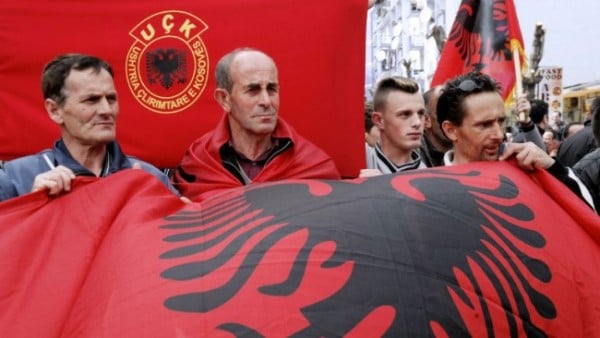
In early April 2013, ethnic Albanians in Kosovo carry the Albanian flag in protest of talks between Kosovo and Serb leaders. The EU-mediated session did not lead to a resolution of the status of the contested territory. Photo credit: AFP PHOTO/ARMEND NIMANI
Life has been good for Serbs living in northern Kosovo. For the past 14 years, since the NATO-led bombing campaign forced Serbia’s government out of power, some 50,000 residents in the four municipalities north of the Ibar River in Kosovo, which is mostly ethnic Albanian, have inhabited a sort of gray area in which both Serbian and Kosovar institutions have co-existed. Under these parallel structures, Serbs in northern Kosovo, where they constitute the majority, have been able to avoid paying taxes or utility bills, and many were paid to do jobs that existed only on paper. Some were paid by both Belgrade and Pristina to do the same job. But under a deal brokered by Catherine Ashton, the European Union’s foreign policy chief, between Serbia and Kosovo last April, the gravy train is about to come to a screeching halt.
The historic breakthrough, dubbed the Brussels Agreement and achieved after ten arduous rounds of negotiation by Lady Ashton, normalized relations with between the two states. As part of the Agreement, Serbia conceded that municipalities in the north will fall under Kosovo’s legal framework in exchange for promises that the region will retain the right to form an association with a high level of autonomy from Pristina. Municipal elections scheduled for November 3rd, through which Serbs in the north will elect local officials with the legislative authority to establish the association, are therefore crucial to institutionalize the Agreement and represent a first step toward the integration of the north in Kosovo.
For Serbs living in northern Kosovo, the current state of affairs was never supposed to happen. In February 2012, Serbs living in the north voted in a referendum to cut ties with Kosovo, and were relieved when a nationalist party, led by the current Prime Minister, Ivica Dačić, won Serbia’s parliamentary election in May 2012. At that time, the notion that the party would turn its back on the north and cut a deal with Kosovo was unimaginable, with many in the north preferring to be legally attached to Serbia through formal partition or even annexation.
Belgrade knows that northern Serbs will not accept being part of Kosovo, but the administration was not willing to hold the historic Agreement hostage to the desires of a minority, especially when the EU set the initialing of the Agreement as a precondition for accession talks to begin. Three days after the signing of the Agreement, the European Commission recommended to national governments that a date formally establishing membership talks be given to Serbia. Negotiations should begin in early 2014.
The ensuing elections will be a litmus test for the Agreement. According to rough estimates, 85 percent of all income in northern Kosovo comes from the public sector, three-quarters of which is derived from Serbia. Even if elections usher in competent officials to form the association, it will not have the financial resources to fill the financial vacuum left by Serbia’s departure. As a result, the number of public sector employees will therefore have to be dramatically reduced. And for those Serbs who do retain their jobs, they are likely to be paid far less since salaries in Kosovo are significantly lower than in Serbia. Serbs in the north are also concerned about access to healthcare and social welfare, as well as their pensions. Resolution on these and other issues were not spelled out clearly in the Agreement.
While their brethren in the rest of Kosovo have come to terms with the authorities, there is open talk of resistance among Serbs in the north, which could cause the Agreement to come undone. Although the Serbian government and the head of the Serbian Orthodox Church have urged local Serbs to partake in the elections, voter turnout is expected to be low. Some of the Agreement’s most vocal opponents believe this will strip the association of any legitimacy and force Serbia to keep its institutions in the north open rather than channel its reduced financial assistance through the association as the Agreement stipulates. The ensuring cold peace between the northern Serbs and Pristina, as the Agreement’s opponents’ thinking goes, might then lead to a renegotiation of the Agreement’s terms, with the north receiving full-fledged autonomy.
There is the additional concern that the security environment in the north will deteriorate dramatically on election day. In the run up to the election, the family of Oliver Ivanovic, a mayoral candidate for Mitrovica and former Secretary of State for Kosovo, was attacked. And gunmen opened fire on the European Union’s Rule of Law Mission (EULEX) on September 19, killing a Lithuanian member. Although the Organization for Security and Co-operation in Europe (OSCE) will have election monitors on the ground, they will not be accompanied by troops from the Nato-led Kosovo Force (KFOR). If violence intensifies on election day, the vote could be marred by irregularities and extremely low turnout, which would only strengthen the position of northern Serbs who oppose to the Agreement.
All this means that much can still go wrong. The elections are an important step in the integration of northern Serbs into Kosovo’s legal and administrative system, but they are clearly only the beginning of a much longer process. The international community has come a long way in trying to resolve the ethnic enmities that exist between the two countries, but more work remains.